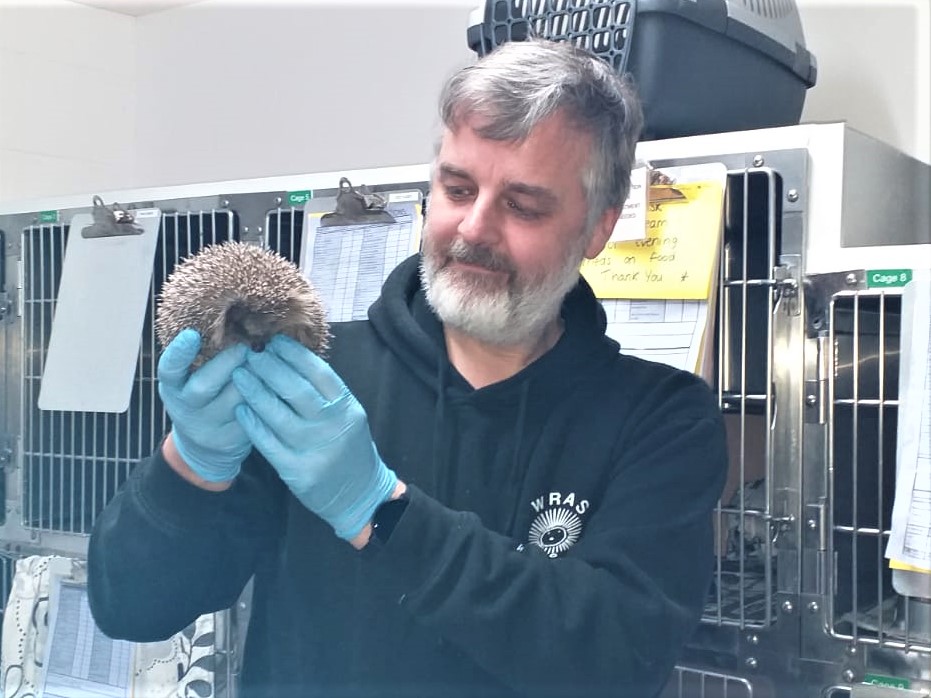
Volunteers and staff at East Sussex Wildlife Rescue & Ambulance Service (WRAS) are asking people to choose Wildlife friendly New Years Resolutions this year after a huge increase in wildlife casualties in 2020 which saw the award winning community charity deal with over 5100 throughout the year for the first time up over 1100 on 2019.
WRAS would like as many people as possible to adopt a New Year’s Resolution to help native wildlife in the UK by undertaking one or more of the following in 2021…
Garden Safety Checks:
Check your garden on a regular basis to ensure they are safe for wildlife. Looking for hazards like uncovered drains which wildlife could fall into. Putting away children's goals, tennis court nets and garden netting to avoid wildlife becoming entangled. Removing broken glass, litter and empty tin cans.
Think Wildlife when driving:
Slow down when driving especially at night and make a mental note where you see dead wildlife and slow down when in those areas.
Avoid dropping litter, waste or causing other Hazards:
Avoid dropping litter or discarding waste into gardens, the streets, or our countryside. Dormice can die inside dropped glass or plastic bottles. Wildlife can get entangled in shopping bags and face coverings. Plastic bottle tops can get caught around birds beaks stopping them from eating. It is not just about household waste, but consider netting using in sports, agriculture or countryside activities and avoid leaving discarded netting from hay or straw in fields, pick up discarded baler twine, avoid fishing in areas where line could become caught up in overhanging vegetation or weeds under water and dispose of line and hooks safely.
Support feed wildlife in healthy and sustainable ways.
Many people enjoy feeding wildlife, which is also very educational and entertaining for children. But overfeeding can be killing with kindness. Moderation is important when feeding wildlife to avoid causing a localized over populations which can lead to neighbour disputes and other local residents persecuting the wildlife with poison or shooting. Over feeding waterfowl at park ponds can cause health issues for ducks as well as problems with rodents leading to poisons being placed. Feed wildlife in a sustainable way, by planting flowers, shrubs and trees, which attract insects or carry fruits and berries which wildlife can then eat. Sustainable feeding can maintain wildlife better and without causing neighbourhood dispute or hatred of wildlife. If you do use feeders don’t forget to clean them regularly and avoid a build-up of rotting food on the ground which can cause illness in birds and small mammals.
Avoid Slug Pellets and Pesticides:
Avoid using slug pellets and to look at alternatives to pesticides in gardens and allotments to help keep our songbirds and hedgehogs safe. But also to look at organic options when buying food from shops to help our countryside pesticide free helping our insects, bees, and wildlife.
Wildlife Gardening:
To create a wildlife area in your garden, encouraging nettles, composting, shallow pond, plants with berries or flowers to attract wildlife. Or if you don’t have a garden try a hanging basket with flowers. Avoid cutting trees and bushes down during the spring and summer when birds are nesting, and to consider having maintenance work done on trees to avoid them over growing or becoming a problem which then requires then to be felled – well-maintained trees are less likely to become dangerous and stay healthy. If you do have to clear vegetation away, try to replant as much as possible using native trees and plants.
Keep Control of Dogs and Cats:
Keep dogs under control in gardens or out in the countryside to avoid them chasing after and injuring wildlife unnecessarily. Where possible keep cats in an hour before dark until an hour after dawn to help cut down on the number of wild animals which are caught by cats. Consider using a bell and a safe cat friendly collar.
Choose Humane Deterrence:
Look at being the more intelligent species and look at long-term humane deterrence rather than cheaper short term solution of shooting, use of glue traps, snap traps or poisoning which in the long run is actually more expensive. If you have creatures entering your home, in the walls, or roof, look at fixing the problem so they can’t get in so you don’t have a reoccurrence after a few months. Be aware that placing poisons or traps in locations where they can catch non-target species is illegal. It is best to seek expert advice rather than try it yourself.
Maintenance – Don’t leave it too late:
Check your property regularly and undertake maintenance before any problems arise, so that wildlife can’t get inside causing any problems or becoming trapped or injured. If you have had problems with birds in your chimney now is a good time to put cowls on the chimney to stop them entering. Check and maintain bird netting and to ensure they aren’t neglected and don’t become death traps. Check soffits and if worn or damaged replace them before wildlife get inside.
Consider supporting your local wildlife rescue.
Wildlife rescue organisations are some of the most underfunded organisations that exist. Unfortunately many organisations have a misguided believe that wildlife rescue organisations don’t benefit the community. We all rely on public support and donations. A donation of as little as £1 a month can make a lasting difference and allow organisations to budget for the future. Also consider leaving them a legacy when you are gone. People can consider volunteering too, but this is not easy currently due to Covid-19.
Anyone wanting to help their local wildlife can also make a donation. You can donate to WRAS via their website www.wildlifeambulance.org or call 01825-873003.
East Sussex WRAS is celebrating its 25th year as a voluntary group in 2021 and WRAS’s founder Trevor Weeks MBE has now completed his 35th year helping wildlife.
Share this!